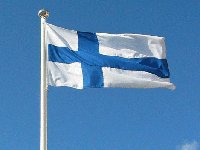Finland: Juvenile fascism for 800 million euros
In the well-fed and seemingly quiet Finland, as if in a retort of medieval alchemist, the infernal mix is brewing whose name is juvenile fascism, a form of the classic fascism. The worst thing is that, apart from the Finns, very few people in the world know about it. A guest of the editor in chief of Pravda.Ru Inna Novikova, human rights advocate Johan Beckman, disclosed the details.
We met with you thanks to Irina Bergseth. Pravda.Ru has been covering her story for nearly two years, trying to help this Russian woman who married in Norway and found herself in a difficult situation, abandoned by the Russian consulate and lawyers. We were the first to see a problem in her story and start talking about it. It turned out that this was a large scale disaster; we had no idea about the situation of Russian women who seem to have fulfilled their dream of a beautiful life abroad.

"Since the beginning of our advocacy efforts in defense of Russian women I have been getting calls from around the world almost every day. I must say that there are certain problematic countries where Russian women suffer."
Let's clarify, is it Russian women or all foreign women?
"Russian women particularly, because only Russian women, Russian mothers find themselves in very complicated, odd and unjust situations in Finland, Norway, and France. I am convinced that the reason behind it is Russophobia and anti-Russian sentiment in certain circles."
Does Russophobia exist in all these countries? We know that not only Russian children are removed from families.
"Of course, all children are removed. Here in Finland many children are removed, and most of them are Finns. But on the other hand, the juvenile justice system is a closed system, and no one has the right to know what is happening there. Therefore, there is no statistics."
There is no statistics, but there is an understanding of the process.
"Of course, some statistics is provided, but we have studied this information and concluded that it was biased.
Are all children in these statistical data citizens of Finland? Do we know how many children are from Russia, Egypt or elsewhere?
"No. But there were studies that revealed that every third child removed in the capital of the country was a foreigner."
Are these Caucasians or some other foreigners?
"We have no information. Juvenile justice is a closed system; it's like a state within a state."
This can't be true. There is official statistics by country, how many children from disadvantaged (by their standards) families are removed, for example, per year.
"Yes. For example, the following numbers were provided: in Finland last year 17,000 children have been removed from families. But this number changes daily."
Johan, is there any information about the merits of such a measure as removal of a child from the family home, for example, in your country? Are these children better off? Is the mass program of removal of the children from their families and placing them in foster homes or orphanages justified and necessary?
"First, the juvenile justice system in Finland is a large-scale program. It is funded by a billion euros from the state budget."
Is it only in Finland?
"Yes. For comparison, I can say that the cost of the police in Finland is 800 million euros per year. I.e., juvenile justice, child protection is much more costly for the Finnish budget than the police. What kind of system is it? This is a system of children concentration camps. These are closed orphanages where the removed children live."
What's the point of removing children and placing them with other families, or concentration camps, as you call them? Is this a way to raise the best citizens of Finland? Will they be more loyal to the country?
"First, this is a certain system of political terror. You are right, this is done to raise loyal citizens. But, unfortunately, we do not know what happens inside this system because there is no information, it is a closed system. Children who get into these camps have special prohibitions for communications, they cannot tell us what is happening there."
What happens when they grow up?
"Of course, they sometimes speak on television, tell us how they had been beaten, raped, how awful it was, they talk about slave labor. But many do not want to talk about this because they want to live a normal life. Naturally, they do not want to appear on television and say "I lived in an orphanage all my childhood, I was raped." Of course, nobody wants to talk about it and will not talk about it. It is very rare when former prisoners of children's concentration camps appear on television, but such cases exist.
We even have a few examples of criminal cases against orphanages because of systemic violence against children that involved regular beatings, even violence of sexual nature. In principle, everyone knows about it, but at this time we cannot eliminate this system."
Are more children placed in orphanages or foster care?
"We have nearly no difference between foster families and orphanages. In Finland, the majority of orphanages are pretty much foster families that formally registered a company, a corporation to raise say, ten children on a Finnish farm."
So they can get two or even ten children?
"Yes, up to ten children. The level of privatization of juvenile justice in Finland is about 70 percent. That is, 70 percent of orphanages are private joint-stock companies, private firms."
Let's talk about control. Or are children removed and then nothing happens?
"There is no control. No one has any authority to control the system."
And no one has ever wondered why there was no control over adoptive families?
"This problem is only discussed by human rights activists and journalists. Just the other day there was a big discussion in the Finnish media about a child removed from its parents and severely beaten by the adoptive parents, but they were brought to a Finnish court."
How did they learn about abuse?
"The child started complaining, she went to the police. But the juvenile justice system operates in such a way that often children, and relatives, and parents do not have rights to resist the authorities. Plus the same authorities may place a child in a psychiatric hospital and prescribe psychotropic drugs."
You are talking about some horrible things; It seems to me that this is a highly unlikely situation. On the other hand, I remember that there was information about a case when social services came to remove a child from a family, and the child's father killed the child and the wife not to have the child removed. Are there many similar incidents?
"Unfortunately, this phenomenon already has a name in our society - mass family suicide. Media reported that in recent years several such cases took place."
Johan, as an international human rights advocate, can you apply with an inquiry to the Ministry of Internal Affairs, the European Council for Human Rights? What kind of tools do you have to make these stories public?
"I and other human rights activists and many private citizens have filed a lawsuit in the European Court of Human Rights. The European Court of Human Rights has already decided and confirmed that Finland systematically violated children's rights. But our government did not react. Each year the UN Committee on Children's Rights criticizes Finland for the fact that children's rights are violated at the level of the state system. When Russian women who have suffered in Finland began speaking publicly, and there are many of them, from Rimma Salonen to Anastasia Zavgorodnyaya, a state information security program was established. An aggressive propaganda was started through the Finnish media saying that stories told by the Russians were lies. For example, Finland's state broadcasting company had a program claiming that all Russian women were actresses and not real Russian mother. They were paid to tell their invented stories."
But at the same time none of the mothers were invited to the studio, their documents were not checked; they did not talk to them.
"Removal of children is a transfer. The international convention on genocide has an article about forced mass movement of children for political reasons. I think that the juvenile justice system, the system of a mass removal of children, is genocide of children."
Does this active propaganda of "successes" in several regions of the juvenile justice have to do with promotion of homosexuality? Because nontraditional families need to get kids somewhere. The juvenile justice system is the tool that would allow a continuous supply of children.
"That's right."
In the end, you are criticized and accused all the time. One of the accusations is that you rely only on the facts provided by Russian mothers.
"This is certainly not the case. I studied the documents, decisions of these cases and in general the entire system. For example, we have the law on protection of children in Finland. Indeed, this law allows the removal of children without a court order and without reason."
What do you mean "without reason"? Does it state so, "without reason"?
"Yes, no reason is required to remove a child. They have no time to investigate cases. They believe that children should immediately be removed, without waiting for a court ruling. They have a concept of "removal of children based on a concern of a social worker." This is a very subjective view of some employees, even one employee of a social service.
It seems that the Finns, and those who reside in Finland, but also in Norway, all parents may expect at any time to be checked by the social services.
"They can come to your home without a warrant and without a court order, just come to your home and take your children."
How do Finns raise their children? More precisely, how should children be raised so as not to anger the social services?
"I think the Finns have forgotten what children or their upbringing mean. There is a lot of talk about children's rights, but in the sense that the fundamental right of a child is a correct (from whose perspective?) choice of orientation at an early age."
In other words, the most important thing in life is to choose not a profession but orientation?
"Maybe it's the same thing, because homosexuality is a profession here, incidentally, a very lucrative one. If a person has decided to become a homosexual, then it is very easy to get into the media, write a book, for example, and then run for elections to get into the parliament, the government, then to become president."
Inna Novikova
Pravda.Ru
Subscribe to Pravda.Ru Telegram channel, Facebook, RSS!



